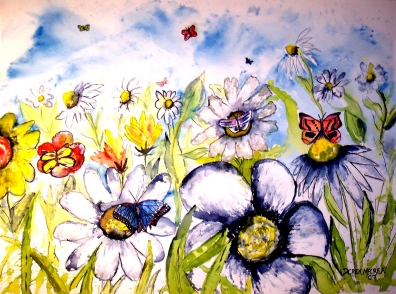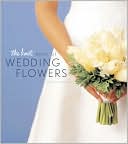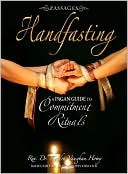
Weddings nowadays tend to have elaborate budgets for their florals and faunas, even in this crunched economy. From real flowers to silk flowers to the clay flowers Matt and I will have, most all weddings incorporate flowers into the ceremony and reception. But where did the tradition of flowers come about? Sure, they're pretty, but like most wedding trappings, they come with a story, too.
According to different sources, noted below, herbs and flowers bring the bride luck, fidelity, and fertility, depending on what they carry down the aisle. Roman couples wore garlands of herbs and garlic to ward off evil spirits and other things that might affect the marriage in the future; the Celts carried bouquets of ivy, thistle, and heather; Swedes had the groom carrying thyme in his pocket to ward off trolls. But these customs aren't only ancient; in present day, those getting married in India would experience brothers of the groom showering the bride in rose petals in an elaborate ceremony to ward off evil and protect the bride in her wedded adventures.
Nowadays, Pagans tend to include specific flowers and herbs into their bouquets to represent different aspects of their relationship and what they hope to bring into it in the future. These flowers and herbs hold special meanings, and are included in traditional weddings as well as handfastings. The flowers don't have to be limited to the bouquet, either; the circle could be surrounded by flower petals, circlets could be created for the bride's hair, the ring pillow could be stuffed with them, or "kissing knots" -- strings of rosemary and roses hung by a string -- could bring luck to anyone who walked under them, not only the bride and groom.
Below are some flowers and herbs, and their magickal significances, provided by TheKnot.com. Feel free to add any of these appropriate flowers to your own ceremony! (Please note this is not at all a complete list.)
Anemone
Meaning: Expectation
Best For: Bouquets and arrangements
Scent: None
In Season: Fall (Japanese) to spring (Wood or De Caen)
Price Range: Moderate
Floral Fact: Anemones bloom in either single or double blossoms.
Baby's Breath
Meaning: Innocence
Best For: Filler in bouquets, corsages, and boutonnieres
Scent: None
In Season: Year-round
Price Range: Inexpensive
Calla Lily
Meaning: Magnificent beauty
Best For: Bouquets and arrangements
Scent: Lightly fragrant
In Season: Spring and summer
Price Range: Expensive
Floral Fact: This large tropical flower is very popular in weddings.
Carnation
Meaning: Pink represents boldness, red symbolizes love, and white indicates talent. Some other colors have negative connotations (see below).
Best For: Bouquets, boutonnieres, and arrangements
Scent: Very light fragrance or none at all, depending on variety
In Season: Year-round
Price Range: Inexpensive
Chrysanthemum (or mum)
Meaning: Wealth, abundance, truth
Best For: Bouquets and arrangements
Scent: None
In Season: Year-round
Price Range: Inexpensive
Floral Fact: Mums come in several varieties, which determine their size and color. The name literally means "golden flower."
Daffodil
Meaning: Regard
Best For: Garden settings, in pots
Scent: None
In Season: Spring
Price Range: Inexpensive (in season)
Daisy
Meaning: Share your feelings
Best For: Bouquets
Scent: None
In Season: Year-round
Price Range: Inexpensive (in season)
Delphinium
Meaning: Swiftness, lightness
Best For: Arrangements
Scent: Lightly fragrant
In Season: Summer
Price Range: Moderate
Freesia
Meaning: Innocence
Best For: Bouquets
Scent: Very fragrant
In Season: Spring and summer
Price Range: Inexpensive (in season)
Gardenia
Meaning: Purity, joy
Best For: Bouquets and boutonnieres
Scent: Very fragrant
In Season: Year-round
Price Range: Expensive
Hydrangea
Meaning: Understanding
Best For: Bouquets and arrangements
Scent: None
In Season: Spring and fall
Price Range: Expensive
Iris
Meaning: A message of faith, wisdom
Best For: In arrangements or potted
Scent: Fragrant
In Season: Spring
Price Range: Moderate to expensive, depending on variety
Floral Fact: Irises come in several sizes; they are usually blue or white, but you may find exotic varieties (including purple ones).
Lilac
Meaning: Love's first emotions
Best For: Filler in arrangements or as part of bouquets, depending on variety
Scent: Very fragrant
In Season: Local lilacs are available in the spring; imported French lilacs are available year-round
Price Range: Moderate to expensive
Floral Fact: The local lilac is grown like a bush, and is used as filler because of its greenery. The French lilac is more flower-like and can be used as such in bouquets and arrangements.
Lily
Meaning: Majesty, truth, honor
Best For: Bouquets and arrangements
Scent: Fragrant
In Season: Summer, but often imported during other seasons
Price Range: Moderate to expensive
Lily of the Valley
Meaning: Happiness
Best For: Bouquets, in combination with other flowers
Scent: Fragrant
In Season: Spring and summer
Price Range: Expensive
Floral Fact: These small, fragile, bell-shaped flowers are considered traditional marriage flowers.
Magnolia
Meaning: Love of nature
Best For: Arrangements
Scent: Depends on variety
In Season: Spring and summer
Price Range: Expensive
Floral Fact: Magnolias are more common in Southern-style weddings, as most magnolia trees grow in the South.
Orchid
Meaning: Love, beauty
Best For: Bouquets, corsages, and boutonnieres
Scent: None
In Season: Year-round -- almost always imported
Price Range: Expensive
Floral Fact: This exotic flower comes in a variety of colors and sizes.
Peony
Meaning: Bashfulness, the American spirit of ambition and determination
Best For: Arrangements
Scent: Lightly fragrant
In Season: Late spring
Price Range: Expensive
Rose
Meaning: Love, joy, beauty
Best For: Bouquets, corsages, boutonnieres, and arrangements
Scent: Lightly fragrant to very fragrant, depending on variety
In Season: Year-round
Price Range: Moderate to expensive
Floral Fact: Roses are the most popular wedding flowers.
Stephanotis
Meaning: Marital happiness
Best For: Bouquets and arrangements
Scent: Very fragrant
In Season: Year-round
Price Range: Moderate
Floral Fact: These trumpet-shape blossoms are traditional bridal flowers, no doubt due to their meaning.
Sunflower
Meaning: Short-stemmed sunflowers mean adoration; long-stemmed sunflowers symbolize haughtiness
Best For: Carrying a single stem down the aisle; potted arrangements
Scent: None
In Season: Fall
Price Range: Inexpensive to moderate in season
Sweet Pea
Meaning: Pleasure
Best For: Garden setting, in vases
Scent: Fragrant
In Season: Late spring and early summer
Price Range: Moderate
Tulip
Meaning: Love, passion
Best For: Arrangements and bouquets
Scent: None
In Season: Late spring
Price Range: Expensive
Floral Fact: These sweet and stately flowers can be found in a myriad of colors, but they are very fragile.
There are also unfavorable flowers. Be sure to NOT put these into your bouquet, as they tend to signify things you might not want in your marriage! Of course, you're more than welcome to turn your nose at tradition, but here they are, just in case. :)
- Christmas Rose: Scandal
- Fig: Idleness
- Foxglove: Insincerity
- Larkspur: Infidelity
- Lavender: Distrust
- Marigold: Grief
- Mulberry: I shall not survive you
- Raspberry: Remorse
- Red Carnation: Alas for my poor heart
- Red Poppy: Consolation
- Rhododendron: Danger
- Striped Carnation: Refusal
- White Poppy: Sleep
- Yellow Carnation: Disdain
- Yellow Chrysanthemum: Slighted Love
- Yellow Lily: Falsehood
- Yellow Rose: Jealousy
There are also herbs and flowers that are sacred to various Gods and Goddesses. If you and your partner feel a special connection to a particular deity, find what plant is sacred to them, and bring it into your ceremony. Whatever your choices, knowing that these herbs and flowers are bringing their specific vibrations to your commitment ritual can bring a Pagan element to the day -- no matter how non-Pagan it might seem!
If you'll notice in our bouquet, we have burnt orange calla lilies (magnificent beauty), the miniature pumpkins (fertility & contacting the Spirit World), alstroemeria (friendship and devotion), some chocolate brown king proteas (change and transformation), some reddish green hipericum berries (banishes evil spirits), and roses (love, joy, and beauty). What do you have in your arrangements?
Sources:



No comments:
Post a Comment